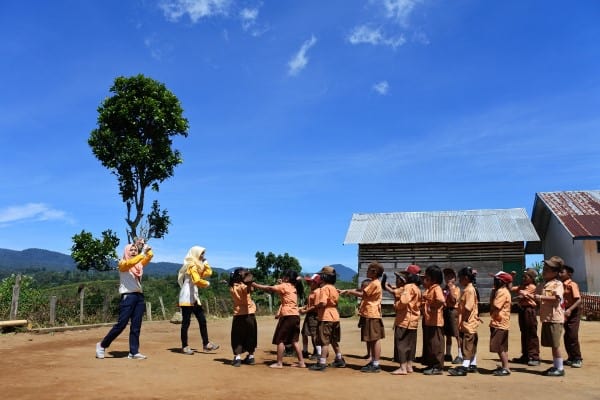This page contains affiliate links. This means if you a follow a link and make a purchase, at no additional cost to you, Humanitarian Careers will receive a commission. Thank you for supporting the site.
The United Nations is a great place to work. If you are a qualified teacher, or training as an educator, there are a wide range of jobs across the UN that are ideal.
We’ve put together this full guide on how to join the UN as a teacher. If you’re interested in the United Nations and wondering how your background in teaching and education can help you land a job, read on!
United Nations Teaching Roles
Teaching and education jobs in the United Nations can be divided into three main categories. Let’s go over each one.
The first type of education roles within the UN are front-line teaching positions. These jobs include directly providing lessons to children and adults as part of UN projects. Across many UN agencies there are programmes providing different types of education to people in need and the UN recruits teachers for these jobs.
Although the UN does have projects it runs itself that provide education and hire teachers, the United Nations also partners with many local organisations to provide education. Many front-line teaching jobs funded by the UN are employed by local NGOs.
The second type of UN teaching roles are in what’s known as capacity building. This is where expertise is provided to governments and local organisations through UN projects. Capacity building is a key part of many UN projects, including humanitarian and development work. The projects rely heavily on educators and so can have good roles for teachers looking to join the United Nations.
The third type of educator positions within the United Nations are as trainers. Many UN programmes involve training people to develop skills or gain a better understanding of social issues. Qualified teachers make great trainers as they understand how to impart knowledge and give education. There are many UN agencies and local partner organisations that hirer trainers.
United Nations Agencies Recruiting Teachers
Almost all the agencies within the United Nations recruit educators in some capacity. One of the UN’s core mandates is to assist people around the world and teachers play a key part in this. However, there are some UN agencies that are more likely to hire qualified teachers, so explore open positions with these first when hunting for jobs within the UN:
- UNICEF
- UNFPA
- WHO
- IOM
- UNHCR
- UNWRA
- UNAIDS
- UN University
UNICEF is the United Nations children’s agency. It’s objective is to help children around the world affected by crises, conflicts and poverty. It also advocates globally for children’s rights. UNICEF often has a wide range of positions open to qualified teachers. Also explore partner organisations funded by UNICEF if you are looking for teaching jobs related to the United Nations.
Another UN agency to target if you are looking for education roles within the United Nations is UNFPA. This is the UN’s population fund and works on sexual and reproductive health (SRH) issues around the world. UNFPA, and its partner organisations, often recruit educators to work on their SRH projects.
The World Health Organisation is another good UN agency to keep an eye on when looking for teaching roles within the United Nations. Many WHO projects include an education element, which can be good for teachers wanting to work in the UN. However, many WHO education roles also require a medical background as well.
IOM is the International Organisation for Migration. Working worldwide with migrants and displaced people, many IOM projects include education. Be sure to explore open positions with IOM and their partner organisations for teaching roles within the UN.
UNHCR is the UN’s refugee agency. They have a huge range of programmes around the world providing services to displaced people. Most UNHCR education projects are implemented by local partners so explore which UN funded projects are recruiting teachers if you ware interested in educator positions within the UN working with refugees.
Similar to UNHCR, UNWRA is the UN work and relief agency for Palestinian refugees. UNWRA runs education projects in Gaza, the West Bank, Jordan, Lebanon and Syria. If you are interested in Palestinian issues and want to work with the UN as a teacher, be sure to apply to UNWRA.
UNAIDS is the United Nations agency leading the fight against HIV/AIDs. They recruit educators in a wide range of roles. Many UNAIDS teaching positions also require a medical background, but if you are interested in preventing the spread of HIV/AIDs or working with survivors, look out for teaching positions with UNAIDS or their local partner organisations.
A really great place for teaching jobs within the UN is the United Nations University. Based in Japan, the UN University is the education and research arm of the UN. They recruit educators for a wide range of subjects and positions. If you are looking for teaching jobs within the UN at university level, the UN University is the top place to apply.
UN Teacher Online Courses
If are interested in working with the United Nations as a teacher, we highly recommend the online course Classroom Management – Fundamentals of Teaching and Education. Schools supported by the UN are often in difficult contexts. Children who attend UN funded schools can have experienced violence, conflict, and trauma. Showing in your UN teacher application that you understand classroom management will significantly help your chances of landing a UN teaching role. Follow the link to the course’s page for more information.
Another online short course we really recommend for people wanting to be a teacher with the United Nations is Get Organized: How to be a Together Teacher. UN teaching jobs are challenging. Showing in your application that you understand how to plan and organise your teaching will be highly valuable. Click the link to the course’s page for more information.
UN supported schools often operate in disaster or conflict zones. Normal teaching methods do not always work in these contexts. We think the online course Uncommon Sense Teaching includes many fantastic techniques that UN teachers can use to engage their students. We also think it would be a great addition to the CV of anyone applying for a UN teaching job. The link is to the course’s page.
Qualifications Needed to Be a Teacher in the UN
If you want to join the United Nations as a teacher, or in an education role, you need to get the right qualifications. Essentially there are two main steps to becoming qualified to work as an educator in the United Nations. The first is to become fully qualified as a teacher, then second is to specialise in an area of education relevant to the UN.
Becoming a qualified teacher is the first key step to joining the UN in an education role. You should aim to complete the formal teaching qualifications required to teach in your home country. In many places this means doing a degree and/or a teacher training course.
To work as a teacher in the United Nations you will need to be fully qualified to teach. This is because the UN will wish to utilise the skills and experience you can bring as a trained teacher. For some UN educator positions you may need a few years professional experience as well.
Another reason you should complete your teacher qualifications before joining the United Nations is because you will need to apply your training to your job. UN jobs are competitive, and they will be seeking to hire fully qualified teachers for their education positions.
Sadly, the UN will not fund your teacher training and so you need to complete your studies in your home country before applying to the United Nations.
The second stage to becoming qualified to work in the UN as a teacher is specialising in the area of education you wish to work in within the United Nations.
As we discussed above, there are a wide range of roles within the UN that are ideal for teachers. Once you have completed your teacher training, you should undertake extra studies in areas such as humanitarian aid, humanitarian education, child protection, capacity building or adult learning. The area you choose to study further should be related to the part of the UN you are aiming to join.
You do not necessarily need to do additional degree level studies on-top of your teacher training to join the UN in an education role. There is a huge range of short courses, many taught online, that give you a good understanding of the areas of the work the UN does. Lots of these courses are free too!
Doing short courses and gaining a strong understanding of the type of work the UN does, in addition to your formal teaching qualifications, will make you a strong candidate when applying to the UN as an educator.

Applying for UN Teaching Jobs
The United Nations job structure and recruitment process is notoriously complex. However, it’s crucial to understand the different job types within the UN if you are going to apply to be an educator.
Roles within the UN are divided into different categories. The two main categories are P, or ‘Professional’ positions and G, or ‘General Service’ roles. The naming is unfortunate as there’s really nothing less professional about the general service jobs!
The big difference between the P and G jobs within the United Nations is where and how they are recruited.
P roles are recruited internationally. For P jobs, staff are deployed abroad as expats. Many P job holders will move between different positions across UN missions.
For G positions, these are recruited locally in the countries in which the UN works. This means you have to be a national of the country in which you are applying for the role.
Within the UN there are also D roles, which are the same but more senior than P positions, as well as ‘National Professional Officers’ (NPO) that work at the same level as P roles but are recruited locally, not internationally.
When applying to work as a teacher or educator within the United Nations, its important to know what role you are applying for and the level of experience required.
Most positions within the UN have a number allocated to them, alongside their letter categorisation. For example, P-3 or G-5. The letter tells you the type of role as we discussed above, the number tells you the seniority of the role and the amount of experience needed for it.
Generally, the lower the number, the more junior the job. This means if you are newly qualified as a teacher and perhaps only have a few years of experience, applying for roles at either G-1 or G-2, or P-2 is you best bet.
If you already have experience working as a teacher or educator, especially within humanitarian aid, development or capacity building roles, perhaps with international NGOs, then you can apply for more senior jobs at the UN.
Another proven root into the United Nations is the UN Volunteers scheme. This can be great for teachers who want to transition into a career in the UN. UN Volunteers offer short to medium term volunteer placements within UN projects. Qualified teachers can explore roles that match their expertise as many of the postings require specific technical skills.
Finally, if you want to join the UN and are recently qualified as a teacher, look into United Nations internships and Young Professionals Programme. These are aimed at young professionals and recent graduates and can be a fantastic first step to a career in the UN.
If you want to know more about how to get a job at the UN, including as a teacher, explore our page on the top United Nations online courses here.






